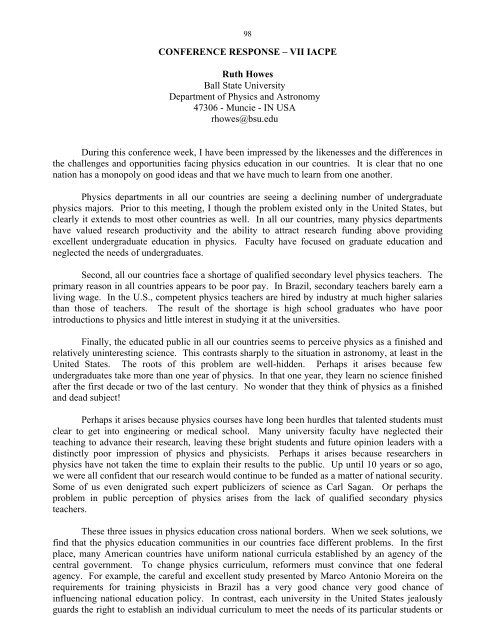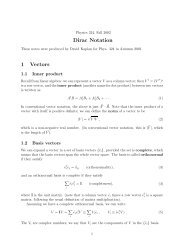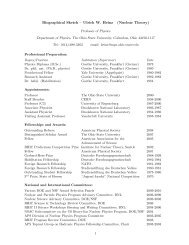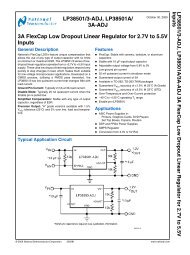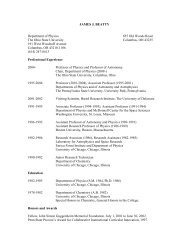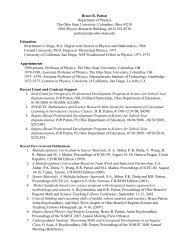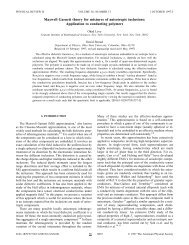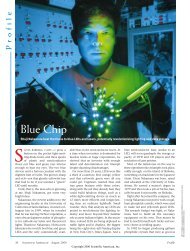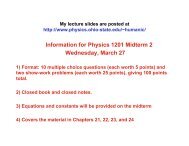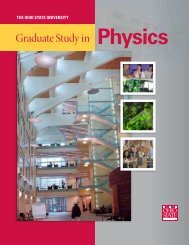Brasil Final Report - Department of Physics - The Ohio State University
Brasil Final Report - Department of Physics - The Ohio State University
Brasil Final Report - Department of Physics - The Ohio State University
Create successful ePaper yourself
Turn your PDF publications into a flip-book with our unique Google optimized e-Paper software.
98<br />
CONFERENCE RESPONSE – VII IACPE<br />
Ruth Howes<br />
Ball <strong>State</strong> <strong>University</strong><br />
<strong>Department</strong> <strong>of</strong> <strong>Physics</strong> and Astronomy<br />
47306 - Muncie - IN USA<br />
rhowes@bsu.edu<br />
During this conference week, I have been impressed by the likenesses and the differences in<br />
the challenges and opportunities facing physics education in our countries. It is clear that no one<br />
nation has a monopoly on good ideas and that we have much to learn from one another.<br />
<strong>Physics</strong> departments in all our countries are seeing a declining number <strong>of</strong> undergraduate<br />
physics majors. Prior to this meeting, I though the problem existed only in the United <strong>State</strong>s, but<br />
clearly it extends to most other countries as well. In all our countries, many physics departments<br />
have valued research productivity and the ability to attract research funding above providing<br />
excellent undergraduate education in physics. Faculty have focused on graduate education and<br />
neglected the needs <strong>of</strong> undergraduates.<br />
Second, all our countries face a shortage <strong>of</strong> qualified secondary level physics teachers. <strong>The</strong><br />
primary reason in all countries appears to be poor pay. In Brazil, secondary teachers barely earn a<br />
living wage. In the U.S., competent physics teachers are hired by industry at much higher salaries<br />
than those <strong>of</strong> teachers. <strong>The</strong> result <strong>of</strong> the shortage is high school graduates who have poor<br />
introductions to physics and little interest in studying it at the universities.<br />
<strong>Final</strong>ly, the educated public in all our countries seems to perceive physics as a finished and<br />
relatively uninteresting science. This contrasts sharply to the situation in astronomy, at least in the<br />
United <strong>State</strong>s. <strong>The</strong> roots <strong>of</strong> this problem are well-hidden. Perhaps it arises because few<br />
undergraduates take more than one year <strong>of</strong> physics. In that one year, they learn no science finished<br />
after the first decade or two <strong>of</strong> the last century. No wonder that they think <strong>of</strong> physics as a finished<br />
and dead subject!<br />
Perhaps it arises because physics courses have long been hurdles that talented students must<br />
clear to get into engineering or medical school. Many university faculty have neglected their<br />
teaching to advance their research, leaving these bright students and future opinion leaders with a<br />
distinctly poor impression <strong>of</strong> physics and physicists. Perhaps it arises because researchers in<br />
physics have not taken the time to explain their results to the public. Up until 10 years or so ago,<br />
we were all confident that our research would continue to be funded as a matter <strong>of</strong> national security.<br />
Some <strong>of</strong> us even denigrated such expert publicizers <strong>of</strong> science as Carl Sagan. Or perhaps the<br />
problem in public perception <strong>of</strong> physics arises from the lack <strong>of</strong> qualified secondary physics<br />
teachers.<br />
<strong>The</strong>se three issues in physics education cross national borders. When we seek solutions, we<br />
find that the physics education communities in our countries face different problems. In the first<br />
place, many American countries have uniform national curricula established by an agency <strong>of</strong> the<br />
central government. To change physics curriculum, reformers must convince that one federal<br />
agency. For example, the careful and excellent study presented by Marco Antonio Moreira on the<br />
requirements for training physicists in Brazil has a very good chance very good chance <strong>of</strong><br />
influencing national education policy. In contrast, each university in the United <strong>State</strong>s jealously<br />
guards the right to establish an individual curriculum to meet the needs <strong>of</strong> its particular students or


